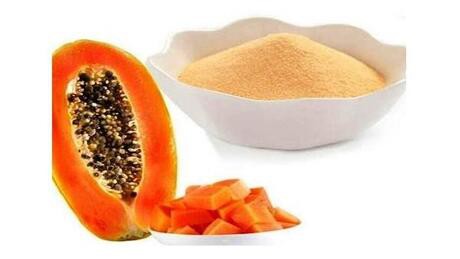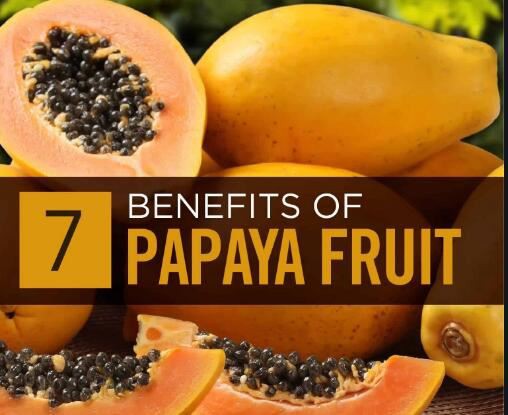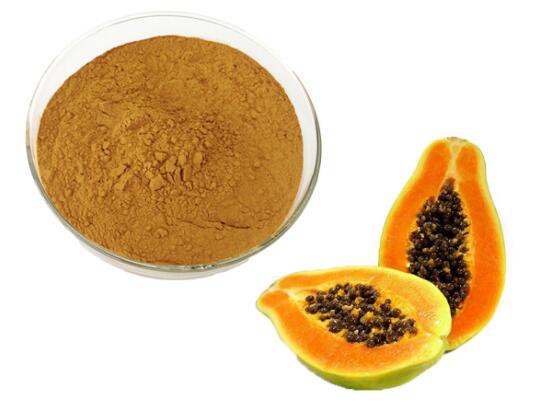Please send me an email
Follow Us:
Product Name:Papaya Powder
Latin Name:Carica Papaya
Specification Ratio: 4:1~20:1;
Part Used: Fruit
Appearance: Light Yellow Powder
Test Method: TLC
Grade:feed grade
Advantage: bulk stock in USA warehouse;
Certificate: KOSHER, HALAL, ISO,ORGANIC CERTIFICATE;
Papaya powder is made from ripe and juicy papaya (Carica Papaya) and is widely used in skin care formulas because it is completely natural and free of chemicals. It is rich in vitamin A which gives your skin a radiant glow and it is also rich in vitamin C which is known for its skin protecting properties.
Papaya extract powder is for external use only and cannot be used for internal consumption. The aroma is similar to the smell of fresh and ripe papaya. It is available in powder form and has an orange color.
Green papaya powder is known for its ability to combat various skin problems and only the highest quality and purity standards are used to deliver the best quality product to our clients. It is completely skin friendly and can therefore be used daily.

Basic Information:
| Product Name | papaya extract |
| Latin Name | Carica Papaya |
| Active ingredient | papain |
| Appearance | 50000u/g-800000u/g |
| CAS Number | 9001-73-4 |
| Chemical Formula | C19H29N7O6 |
| Molar Mass | 451.477 |
| Storage | Store in dry&cool place |
| Sample | Available for free |
|
tems |
Standards |
Results |
|
Physical Analysis |
||
|
Description |
Light Brown Powder |
Complies |
|
Assay |
10:1 |
Complies |
|
Mesh Size |
100 % pass 80 mesh |
Complies |
|
Ash |
≤ 5.0% |
2.85% |
|
Loss on Drying |
≤ 5.0% |
2.82% |
|
Chemical Analysis |
||
|
Heavy Metal |
≤ 10.0 mg/kg |
Complies |
|
Pb |
≤ 2.0 mg/kg |
Complies |
|
As |
≤ 1.0 mg/kg |
Complies |
|
Hg |
≤ 0.1 mg/kg |
Complies |
|
Microbiological Analysis |
||
|
Residue of Pesticide |
Negative |
Negative |
|
Total Plate Count |
≤ 1000cfu/g |
Complies |
|
Yeast&Mold |
≤ 100cfu/g |
Complies |
|
E.coil |
Negative |
Negative |
|
Salmonella |
Negative |
Negative |

Papaya powder can help support your dog’s health. Papaya includes essential and nonessential nutrients-vitamins A, K and C. While nutrients are always beneficial, papaya extract powder stands out due to its incredible phytonutrient profile (natural compounds found in plant foods like vegetables, fruits, whole grains and legumes) and unique digestive support properties that are unlikely to be found in most commercial and homemade dog foods.
Here are some of papaya’s most helpful nutrients:
Papain: Papain is a digestive, plant-based enzyme that helps break down protein (proteolytic). Papain is heat-sensitive, so ensure you are feeding the fruit raw. Because commercially processed dog food (like kibble) is made with high heat, it is unlikely that most dogs are benefitting from any kind of heat-sensitive enzyme in their food, including papain.
However, the flesh of papaya extract powder is an excellent source for this enzyme. While papaya extract powder are widely available for purchase, you can give your dog a gentle digestive boost by feeding whole, fresh papaya. This may be especially beneficial to older dogs who see a natural decline in digestive abilities with age.
Vitamin A (beta-carotene): Dogs will typically get enough Vitamin A from their normal kibble. However, papaya contains a precursor to Vitamin A called beta-carotene. Normally, beta-carotene is converted to Vitamin A in the liver. When the dog is consuming enough Vitamin A, though, beta-carotene can be used as an antioxidant instead of becoming the essential nutrient form of Vitamin A.
Lycopene: Lycopene is a phytonutrient (a chemical compound produced by plants) that is classified as a carotenoid — a pigment from plants that acts as an antioxidant. But lycopene doesn’t turn into Vitamin A in your pet’s digestive system.
However, lycopene still functions as an antioxidant that can be beneficial for the heart, skin, lungs, brain, and eyes. Research has been looking at the role of lycopene in the prevention of Parkinson’s Disease in humans. There also is some association between lycopene and reduced risk of bladder cancer. Because lycopene is not found in food items traditionally fed to dogs, it is unlikely that most dogs are consuming any level of lycopene.
Lutein: Lutein is also a carotenoid and is known for its potential role in preventing the progression of macular degeneration. However, there is still ongoing research in determining its role in cancer prevention (particularly non-Hodgkin’s lymphoma) and Parkinson’s Disease. There is also research being done regarding Lutein’s role in preventing an excessive decline in cognitive abilities that come naturally with age, making Lutein another excellent choice for older dogs.
Vitamin C: While most think of oranges when they think of sources of Vitamin C, green papaya powder actually have 25% more Vitamin C than oranges per gram. Vitamin C plays a role in immune system support, but it is also essential in preventing free radical damage to the joints and can therefore be thought of as a food-based choice for preventative joint care.
While dogs can synthesize Vitamin C, not every dog can create enough. Moreover, making nutrients requires other resources. Providing dietary Vitamin C in moderate amounts from whole food sources can help free some of the resources used to create Vitamin C.
Vitamin K: Like Vitamins A and C, there is plenty of Vitamin K in papaya extract powder. Vitamin K is a fat-soluble vitamin that is good for your dog’s liver and blood health. It’s especially important for effective blood clotting.
Fiber: Fiber helps dogs maintain normal bowel movements and avoid constipation. Additionally, many fiber sources help support a wider diversity of good bacteria that live in the gut. Because papaya is not commonly fed to dogs, papaya may help support the gut microbiome. Of course, if a dog gets too much fiber or is sensitive to fiber, feed papaya in careful moderation.

Papaya Powder Application:
Feeds Industry.
Where to buy Papaya Powder?
Just send email to info@greenagribio.com, or submit your requirement in bottom form, we are of service at any time!
Hot Tags: papaya powder